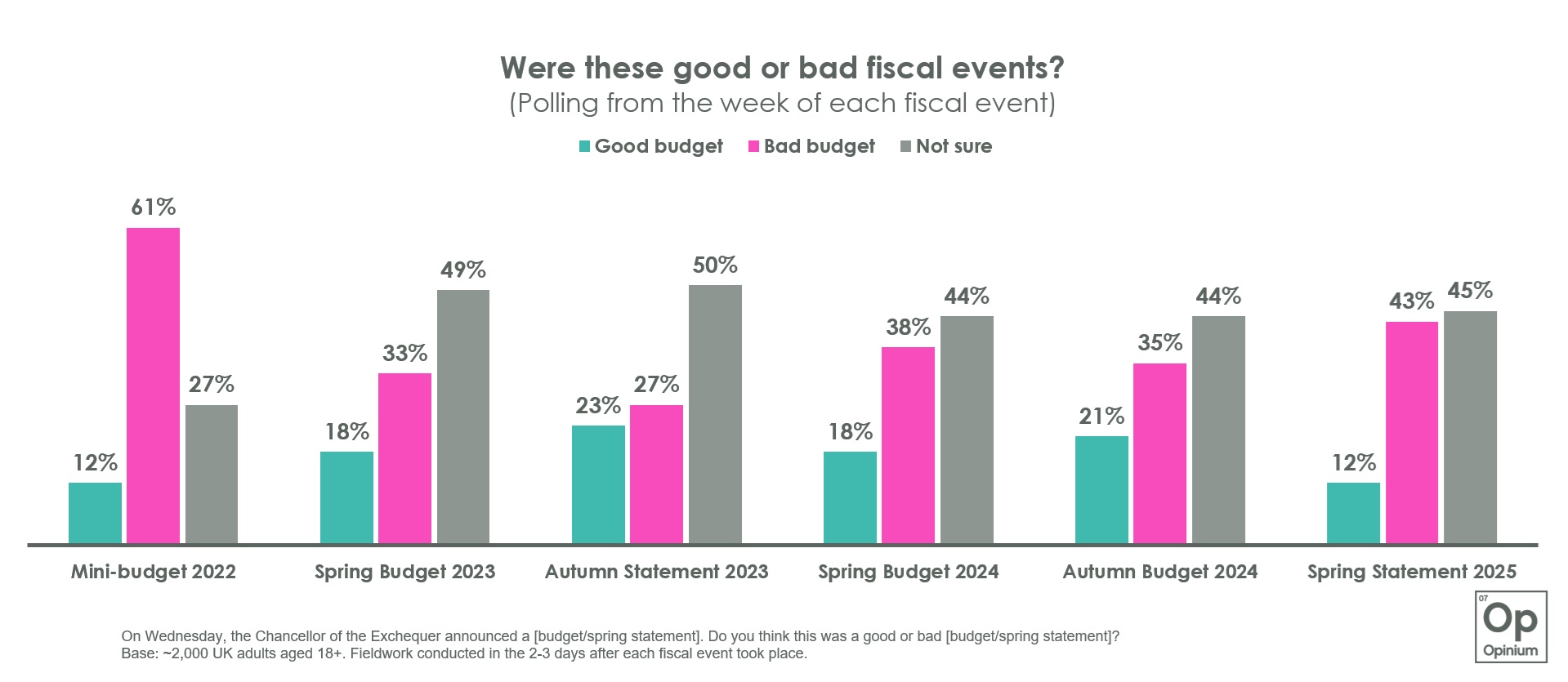James Crouch is head of policy and public affairs research at Opinium.
The Labour Government’s handling of the economy and public finances has been become a growing problem since the moment it took office. Rachel Reeves’ missed opportunity last week is only the latest example of a broader communications issue, tethered to an unclear strategy that has plagued Labour since being in office.
Labour’s electoral success in 2024 was largely due to the last government’s hugely damaged economic reputation, which Reeves and Sir Keir Starmer capitalised on very effectively in opposition.
Once in power, however, they have struggled to present a clear vision for economic recovery. With households facing prolonged financial pressure, voters expected decisive action and a roadmap to recovery. Instead, Labour has failed to provide a compelling plan.
The Spring Statement was the best opportunity Reeves was going to going have to reset the narrative and regain some public confidence. However, rather than seizing the moment, Opinium’s poll for the Observer, conducted in the days after the Statement, shows the Chancellor delivered the worst fiscal event since Liz Truss’s mini-budget: 43 per cent thought it was a bad spring statement, whilst only 12 per cent thought it was good.

Labour’s failure is not simply a matter of one bad misstep – it reflects a deeper strategic problem. The party has struggled to define a long-term economic vision and communicate it effectively to the public.
Poor planning has been evident throughout their tenure. Labour campaigned on the promise of no tax increases for working people and ruled out major revenue-raising measures. Upon taking office, they suddenly pointed to a supposed £22bn ‘black hole’ – despite the government’s £1.2 trillion budget – to justify tax hikes and spending cuts. This inconsistency has only added to the public’s confusion and frustration.
Polling from Opinium conducted before the Spring Statement indicated that, eight months in, Labour had given voters no clear sense of direction. Should government spend more, spend less, or maintain the status quo? No one knew, because the Government itself had not provided an answer. Instead, it appears to be aimlessly bumping along its fiscal limits without articulating a broader economic strategy.
Adding to the disappointment, the Spring Statement’s delivery was also mishandled in the short term. The announcement was overshadowed by the controversial benefits reforms in the weeks prior. While the Statement did include some popular policies, overall it added up to less than the sum of its parts in voters’ minds.
In the end, all the public saw was a chancellor taking a massive swipe at the vulnerable (58 per cent think the Statement makes disabled people worse off) and the poor (50 per cent think it makes lower income groups worse off) – all without ever really telling people why. The failure to properly frame and explain these measures is not what Labour’s damaged credibility needed.
Governments rarely get chances to fully reset their political narrative, and Labour had a potential opportunity to do so with this Spring Statement. Instead, for both No10 and No11 Downing Street, last week was a reminder that failing to communicate effectively can be just as damaging as failing to govern competently.





![‘We All Owe Him (Elon) a Huge Debt of Gratitude’ [WATCH]](https://www.right2024.com/wp-content/uploads/2025/03/‘We-All-Owe-Him-Elon-a-Huge-Debt-of-Gratitude-350x250.jpg)
![Trump's Admin Guts Another ‘Rogue Government Agency with Zero Accountability’ [WATCH]](https://www.right2024.com/wp-content/uploads/2025/03/Trumps-Admin-Guts-Another-‘Rogue-Government-Agency-with-Zero-Accountability-350x250.jpg)




![NCAA Champ Salutes President Trump After ‘BIGGEST UPSET IN COLLEGE WRESTLING HISTORY’ [WATCH]](https://www.right2024.com/wp-content/uploads/2025/03/NCAA-Champ-Salutes-President-Trump-After-‘BIGGEST-UPSET-IN-COLLEGE-350x250.jpg)





